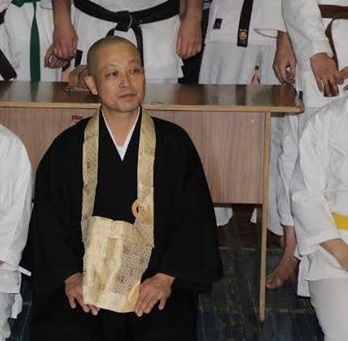◯波羅蜜多
波羅蜜多とは「悟りの岸に到る」という意味です。ブッダが説法された寺院は、マガタ国の都ラージャガハの竹林精舎、コーサラ国の都シュラヴァスティの祇園精舎、マガタ国のクリドラクータ:霊鷲精舎など5つが知られています。
霊鷲精舎は小高い山の上で、ブッダや弟子たちは石窟の中で寝泊まりしていました。信者たちはブッダの説法を聴くために、川をわたり山の上まで登ってきました。その川が増水することもあったでしょう。信者たちは上流まで何十キロメートルも歩いて川をわたり、丘を登って精舎にたどり着いて仏陀の説法を聴きました。それで岸に渡る、パラミータという言葉が使われたと思われます。ブッダをこの目に見て説法を聴く彼らの態度は「柔和質直者」(心が温和で偽りのない人)であった」と『法華経』「如来寿量品」にあります。
先に大乗仏教には六波羅蜜の教えがあると述べました。これを大乗仏教が始まった当時、紀元前一世紀から二世紀ごろのインドの社会状況から考えてみましょう。当時は東西交易の発展していく時代で、盗賊に襲われた人も多かったのでしょう。
そこで仏教徒はどうしたか。これが「六波羅蜜」の原点です。これは私たちの本来そなわっているモラルで規則ではありません。これに目覚めることが慈しみに目覚めることです。
六波羅蜜=悟りの岸に至る六つの徳目
*布施=お返しのできない人に施す
*持戒=他人の物を取らない
*忍辱=取られても怒らない
*精進=常に行う
*禅定=心が定まっていて疑わない
*智慧=心に自然に起きる
*Pārāmitā=perfection
‘Pārāmitā’ means to go across to the shore of enlightenment. The temples of that Buddha gave sermons are well-known five temples, Venuvana-vihãra in Rajagriha Magadha, Jetavana-vihara in Shravasti Kosala kingdom, Gijjakuta in Magadha, et cetera.
Gijjakuta in Magadha locate on the hill where a slightly higher place. Buddha and his disciples had lodged at the cave temple. Buddha’s followers went across the river and climbed the hill for the purpose of attendance at Buddha’s sermon. It occurred the river overflowed. Buddhas followers walked long ways so far kilometers further upriver, climbed the hill, arrived at there, attended Buddha’s sermon. Thus, it would be to say ‘Pārāmitā’. ‘Hokke’ sutra mention that their attitude to perticipate Buddha’s sermon seems to be tender and sincere.
I mentioned previously that Mahayana Buddhism has the teaching of Six Perfection. Let me study it in view of Mahayana Buddhism beginning period, the situation of Indian society during the 1st century BC to the 2nd century. The commerce of the East and the West had developed at that time. Accordingly, I consider that numerous person who were attacked by thieves.
How did Buddhist followers conduct themselves? This is the origin of ‘Six perfection.’ It is our inborn morality and is not the regulations. What awaking it is what awaking mercy.
‘Six perfections’:
*Dana pārāmitā; generosity, giving of oneself
*Sila pārāmitā ; virtue, morality, discipline, proper conduct
*Ksānti pārāmitā; patience tolerance, forbearance, acceptance, endurance
*Virya pārāmitā: energy, diligence, vigor, effort.
*Dhynāa pārāmitā; concentration, contemplation
*Prajñyā pārāmitā; wisdom, insight



















